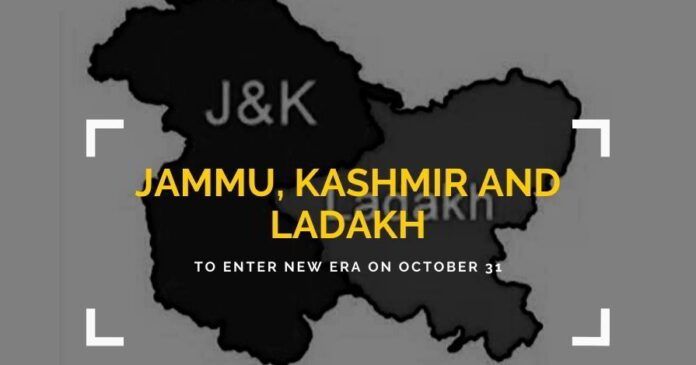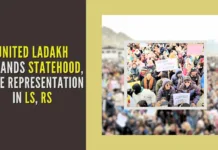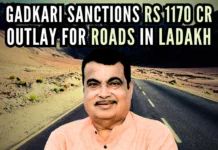
The Jammu & Kashmir Legislative Assembly will have limited powers. It will have no control whatsoever over the highly crucial Home Department. It will be the Union Home Ministry which will control it
October 31st is the birth anniversary of Iron Man of India, Sardar Patel. It was he who unified India. It was he who integrated more than 500 princely states into the Indian Dominion using his effective and skilful leadership. He even integrated the Muslim-ruled Hindu-majority Hyderabad and Junagarh princely states into India. The then Prime Minister JL Nehru didn’t allow Sardar Patel to handle the sensitive border princely State of Jammu & Kashmir. He himself handled it and he bungled. He alienated Jammu & Kashmir from India through divisive Article 370 and discriminatory Article 35A. Earlier on December 30, 1948, he had taken the issue of Pakistani war on Jammu & Kashmir to the United Nations under a wrong provision, Article 35 of the Charter of the UN. His move hurt the country’s sovereign interests in Jammu & Kashmir by creating an impression that the state was not an integral part of India to the same extent as other states. And, a day later, he enforced a unilateral ceasefire. His mind-boggling ceasefire helped the aggressor, Pakistan, to occupy 33% of Jammu & Kashmir territories. Sadly, powers-that-be in New Delhi, the international community, commentators, and even Indian media call it Pakistan-occupied-Kashmir. It’s wrong. It should be called Pakistan-occupied-Jammu and Ladakh as all the areas under the illegal occupation of Pakistan belong to Jammu and Ladakh. Not even an inch of Kashmiri-speaking area is under Pakistan. Anyway, the nation will celebrate the birth anniversary of Sardar Patel on October 31 with great pomp and show and remember him and his splendid contribution to India. This is one part of the important story.
The other part of the story is also very significant. It deals with the political future of Jammu, Kashmir and Ladakh and their constitutional status vis-à-vis India. This part is significant because that day a history of the sort will be created. That day, the historic Jammu & Kashmir Reorganization Act, 2019 (Act No. 34 of 2019) will come into force. That day, Jammu & Kashmir State, which was founded by Maharaja Gulab Singh of Jammu in March 1846 by adding Kashmir to the Dogra Kingdom comprising Jammu and Ladakh under the Treaty of Amritsar, will be bifurcated into two Union Territories of Jammu & Kashmir and Ladakh. In other words, that day, the 173-year-old Jammu & Kashmir State will become a story of the past. Both the Union Territories will be directly administered by the Union Home Ministry from October 31 onwards.
The financial powers of the Assembly of Union Territory of Jammu & Kashmir will also be limited.
While the Union Territory of Jammu & Kashmir will have a downgraded legislative assembly, the Union Territory of Ladakh will not have even such an institution. The Legislative Assembly of Union Territory of Jammu & Kashmir will come into being only after a fresh delimitation of the assembly constituencies. It will take time. It may take two to three years. That day, both the Union Territories will come under the ambit of the Indian Constitution and Indian Laws, including civil and criminal procedure codes, and the Central institutions. That day, Jammu & Kashmir will get the political status similar to the one Puducherry has and Ladakh will get the political status the Union Territory of Chandigarh has. The only difference will be that Ladakh will continue to have two autonomous hill development councils, one each at Leh and Kargil. That day, the office of Governor will be renamed as Lt Governor. He will be an all-powerful constitutional authority. He will also act in his discretion in matters concerning All-India Services (IAS) and Anti-Corruption Bureau (ACB).
The Jammu & Kashmir Legislative Assembly will have limited powers. It will have no control whatsoever over the highly crucial Home Department. It will be the Union Home Ministry which will control it. The internal security issue will be the sole preserve of the Union Home Ministry.
As said, the powers of the Legislative Assembly will be limited. It will have the power to make laws for the whole or any part of the Union Territory of Jammu & Kashmir with respect to matters enumerated in the State List except the subjects mentioned at Entries 1 and 2, namely “Public Order” and “Police“, respectively, or the Concurrent List in the Seventh Schedule to the Constitution of India in so far as any matter is applicable to the Union Territory. “Nothing in sub-section (1) shall derogate from the powers conferred on Parliament by the Constitution to make laws with respect to any matter for the Union Territory of Jammu & Kashmir or any part thereof,” the Reorganization Act further says.
The financial powers of the Assembly of Union Territory of Jammu & Kashmir will also be limited. The Act in this regards, inter-alia, reads like this: “A Bill or amendment shall not be introduced into, or moved in, the Legislative Assembly except on the recommendation of the Lt Governor, if such Bill or Amendment makes provision for any of the following matters, namely:- (a) the imposition, abolition, remission, alteration or regulation of any tax; (b) the amendment of the law with respect to any financial obligations undertaken or to be undertaken by the Government of the Union Territory; (c) the appropriation of money out of the Consolidated Fund of the Union Territory; (d) the declaring of any expenditure to be expenditure charged on the Consolidated Fund of the Union Territory or the increasing of the amount of any such expenditure”.
However, matters concerning land – “ownership rights, land tenures, transfer and alienation of agricultural land, land improvement or agricultural loans” – will be under the jurisdiction of the elected government. Likewise, “land revenue, including the assessment and collection of revenue, maintenance of land records, survey for revenue purposes and record of rights, and alienation” will also be under the elected government in the Union Territory of Jammu & Kashmir.
As for the existing High Court in Jammu & Kashmir is concerned, it will serve as a common institution for both the UTs.
All this only serve to demonstrate that things will change drastically and the Union Territories of Jammu & Kashmir and Ladakh will become part of the national mainstream. Not just this, the status of all the Indians, including the people of Jammu & Kashmir and Ladakh, would be the same. But more than that, the women of Jammu & Kashmir and Ladakh and refugees from Pakistan and members of the Valmiki samaj and Gorkha will enjoy equal rights. It’s hoped that new dispensation under the direct control of the Union Government will dispense justice to the ignored regions and ignored communities, abandon the 72-year-old obnoxious appeasement policy and treat all equally at all levels and in all spheres.
Note:
1. The views expressed here are those of the author and do not necessarily represent or reflect the views of PGurus.
- ‘Kashmir My core constituency’: Revisiting July 12, 2003 to understand politics, Omar Abdullah-style - March 15, 2024
- Total deviation from traditional approach: Seven takeaways from PM Modi’s March 7 Srinagar visit - March 9, 2024
- Status of political parties: Why is further J&K reorganization imperative? - March 1, 2024










